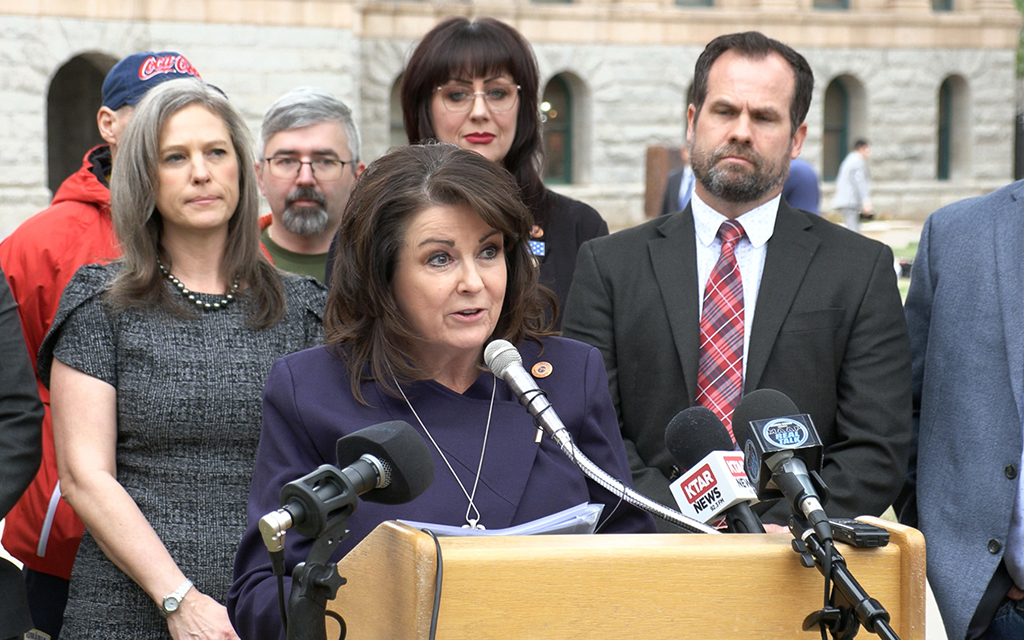
Sen. Sine Kerr, R-Buckeye, said her “Arizona Women’s Bill of Rights” aims to protect women from “unwanted intrusion” by transgender people, by redefining sex in state law as male and female only. But critics say the bill would only harm transgender individuals. (Photo by Jonah Krell/Cronkite News)
PHOENIX – GOP senators want to rewrite state law to define sex as only male and female and not “a person’s subjective sense of self,” a move they said will protect women and girls from “unwanted intrusions” by transgender women.
But opponents called the bill another “LGBTQ+ Erasure Act,” little more than an attempt “by people who want to erase LGBTQ+ people, particularly transgender and nonbinary folks, from public life.”
“SB 1628 would put federal funds for schools, domestic violence centers, and rape crisis centers at risk, and it would harm Arizonans simply trying to live their lives,” said Bridget Sharpe, Arizona director of the Human Rights Campaign, in a written statement.
Sharpe’s statement said the bill is part of a national push targeting transgender rights, a “well-funded, systematic effort to dismantle personal freedoms, roll back progress, and harass and intimidate communities into submission.”
But Sen. Sine Kerr, R-Buckeye, the lead sponsor of the “Arizona Women’s Bill of Rights,” said SB 1628 “affirms the simple truth that there are two sexes – male and female – and … helps protect women and girls from unwanted intrusions by males into intimate spaces.”
“Women’s and girls’ hard-won equality is threatened when males identifying as female are permitted to take women’s places,” she said. “Males should not be eligible for sports, scholarships or any other benefits that have been, for legitimate and important purposes, set aside specifically for women and girls.”
Kerr’s bill would define “sex-based terms” in state law, defining “male” as a person with a reproductive system that produces sperm and “female” as someone with a reproductive system that produces ova. It would replace the term “gender” with “sex” throughout state laws and policies.
According to the National Institutes of Health Office of Research on Women’s Health, sex is based on “anatomy, physiology, genetics, and hormones,” while a person’s gender is “self-identified,” encompassing “social and cultural expectations about status characteristics, and behavior.”
SB 1628 also allows the state to provide “a separate single-sex environment for a male or female” within athletics, locker rooms, bathrooms, living facilities, domestic violence shelters and sexual assault crisis centers.
Kerr was backed Tuesday by Paula Scanlan, a former University of Pennsylvania swimmer who spoke about having a transgender woman, Lia Thomas, as a teammate. Thomas won gold in the women’s 500-yard freestyle at the 2022 NCAA National Championship.
“This is not hypothetical, this is real,” Scanlan said at a news conference outside the state Capitol. “I know women who have lost roster spots and spots on the podium. I know of women with sexual trauma who are adversely impacted by having biological males in the locker room without their consent.”
Scanlan, who said she was sexually assaulted in 2016 before her time at UPenn, said having to share a locker room with a transgender woman can be particularly difficult for assault victims.
Kerr could not point to any transgender women competing in Arizona women’s sports, but turned to Scanlan, who said it is good to pass legislation “before it happens.”
Passing a bill, however, does not mean it will become law. Democratic Gov. Katie Hobbs last year vetoed several bills that would have restricted transgender rights, and she has vowed to continue doing so.
When asked for comment on Kerr’s bill, a spokesperson for Hobbs said in an email Tuesday that the governor “has made clear her stance on legislation that harms transgender youth.” She attached Hobbs’ veto letter of a bill last year that would have prohibited school employees from using pronouns different from those assigned at a child’s birth, without parental consent.
“As politicians across the country continue to pass harmful legislation directed at transgender youth, I have a clear message to the people of Arizona: I will veto every bill that aims to attack and harm children,” Hobbs wrote then.
 Former collegiate swimmer Paula Scanlan, who spoke about having to compete against a transgender woman on her team, came out to support Kerr’s bill. (Photo by Jonah Krell/Cronkite News)
Former collegiate swimmer Paula Scanlan, who spoke about having to compete against a transgender woman on her team, came out to support Kerr’s bill. (Photo by Jonah Krell/Cronkite News)The issue is not new in Arizona. A federal judge in 2023 blocked state enforcement of a law that would have banned transgender women from competing in women’s sports.
Despite the courts and Hobbs’ veto-happy history, Kerr said she remains optimistic.
“I’m hopeful that we’ll have bipartisan support because of what it does and how it protects women and girls,” Kerr said. “I think that that’s a bipartisan issue that we can all wrap around.”
She said the bill does not change current law or create restrictions on anyone’s legal rights.
“This does not preclude anything with the trans community,” she said. “What this law does is that it clarifies the definitions, this is a definitional bill, and it clarifies the definitions already currently in state law.”
But Sharpe said the bill will be much more far-reaching that Kerr claims, preventing transgender people from asserting claims of sex discrimination or updating government documents to reflect their gender identity. She raised concerns about transgender people being forced to use bathrooms and stay in housing inconsistent with their gender identity.
“We don’t need to understand everything about each other to treat each other with dignity and respect, and this bill absolutely does the opposite,” Sharpe’s statement said.




